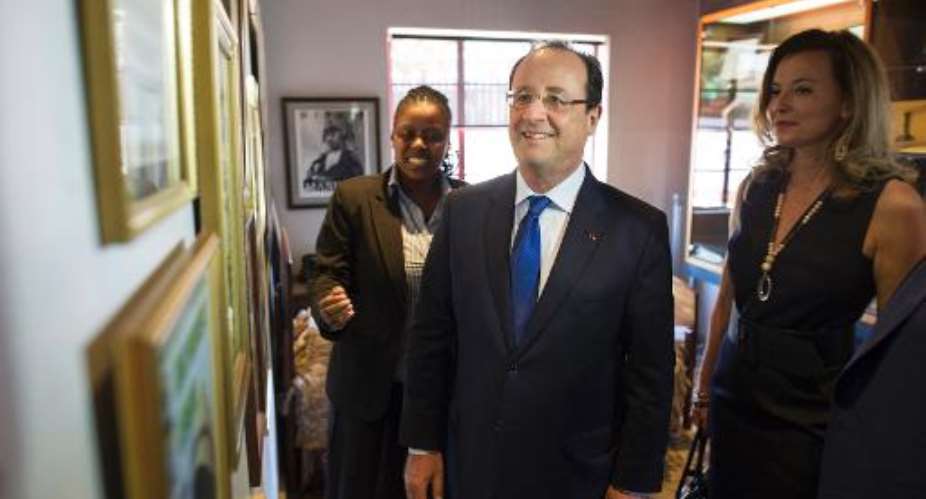Soweto (South Africa) (AFP) - French President Francois Hollande hailed anti-apartheid icon Nelson Mandela's struggle for equality and forgiveness Tuesday as he wrapped up a state visit to South Africa.
Hollande spent the morning in the formerly blacks-only Soweto township southwest of Johannesburg, a hotbed for resistance against the white supremacist apartheid regime which ended 19 years ago.
"Even today, there are battles to be fought so we can live together, to avoid racism and xenophobia," said Hollande after an emotional tour of Mandela's former house and archives.
"All this isn't so long ago," he said.
"The battle for human dignity, for equality, for respect and tolerance... these battles live on even long after the heroes who waged them," he added.
Hollande is currently battling a rise in anti-immigrant sentiment at home, which has sparked a wave of conservatism that handed far-right party the National Front a key by-election win on Sunday.
Accompanied by his partner Valerie Trierweiler and South African President Jacob Zuma, the French leader also visited a memorial to Hector Pieterson, a 13-year-old schoolboy shot dead by police during a 1976 uprising.
Dozens died in clashes when school children in Soweto protested being taught in Afrikaans, the language of Dutch descendants.
"It is very moving to come to Soweto, where hardly 40 years ago children died defending their freedom, their dignity," said Hollande.
He paid a "very emotional" visit to the four-roomed house where Mandela lived before his 27-year-imprisonment for activism against the racist regime.
"Coming to this house you get the feeling of a fighter, a combatant, a militant who lived here among his own," said Hollande after spending time at the matchbox brick house, which is now a national monument.
The house where Mandela lived from 1946 to 1965 in Soweto was the centre of his political activity prior to his arrest.
In the afternoon the French delegation visited Mandela's foundation, close to his current house in Johannesburg's upmarket suburb of Houghton.
Mandela's wife Machel showed a visibly moved Hollande the original court document from 1963 that condemned him to life in prison.
He paged through the workbook where Mandela drafted letters to his wife and children, and a calendar where he had carefully noted his weight and blood pressure, the names of visitors and even his dreams.
"One day maybe someone can write a book on the dreams of Mandela!" said Hollande.
Afterwards the foundation said it had been "honoured to share an important part of Madiba's legacy with leaders who respect that legacy so profoundly," referring to the former statesman by his tribal name.
Tuesday marked the 20th anniversary of Mandela being awarded the Nobel Peace Prize jointly with then-president FW de Klerk for negotiating an end to apartheid.
Mandela went on to become the country's first black president after all-race elections in 1994.
The ailing 95-year-old, who once regularly received visiting presidents and celebrities, receives few visitors these days aside from close relatives.
Discharged from hospital after a three-month stay in September, the critically ill former statesman is being treated at his Johannesburg home.
Family members have said he is conscious, though still very weak.
Whereas Hollande's second and final day in South Africa was mostly dedicated to Mandela and his struggle for freedom, his first had been spent in meetings with Zuma, business leaders and the French community.
On Monday he also signed and finalised deals worth over $8 billion with Africa's largest economy to build a thermal power plant and overhaul the aged fleet of its passenger rail service.
The leaders further discussed African political crises as two influential powers on the continent, including the need for "quick" action to prevent implosion in the Central African Republic, which has been wracked by violence since a March coup.





 Some people expect us to be dogmatic, sycophantic supporters of Akufo-Addo even ...
Some people expect us to be dogmatic, sycophantic supporters of Akufo-Addo even ...
 NDC Campaign: James Agyenim Boateng is the right man to handle communications
NDC Campaign: James Agyenim Boateng is the right man to handle communications
 Mahama pledges to contribute to the development of Gonja Kindom
Mahama pledges to contribute to the development of Gonja Kindom
 “Ghanaman Time”: We've normalized the abnormal, accepted the unacceptable — Dots...
“Ghanaman Time”: We've normalized the abnormal, accepted the unacceptable — Dots...
 Bawumia begins nationwide campaign, starts in Eastern Region today
Bawumia begins nationwide campaign, starts in Eastern Region today
 Bawumia kicks off nationwide campaign with “bold solutions” for Ghana's future
Bawumia kicks off nationwide campaign with “bold solutions” for Ghana's future
 You cannot choose your successor; it’s only God who can – Mahama to Akufo-Addo
You cannot choose your successor; it’s only God who can – Mahama to Akufo-Addo
 Ejisu by-election: Vote for independent candidate Kwabena Owusu Aduomi to uphold...
Ejisu by-election: Vote for independent candidate Kwabena Owusu Aduomi to uphold...
 IT is a major skill needed for the job market - Industry Players
IT is a major skill needed for the job market - Industry Players
 S. Africa's ex-president Zuma makes surprise comeback
S. Africa's ex-president Zuma makes surprise comeback
